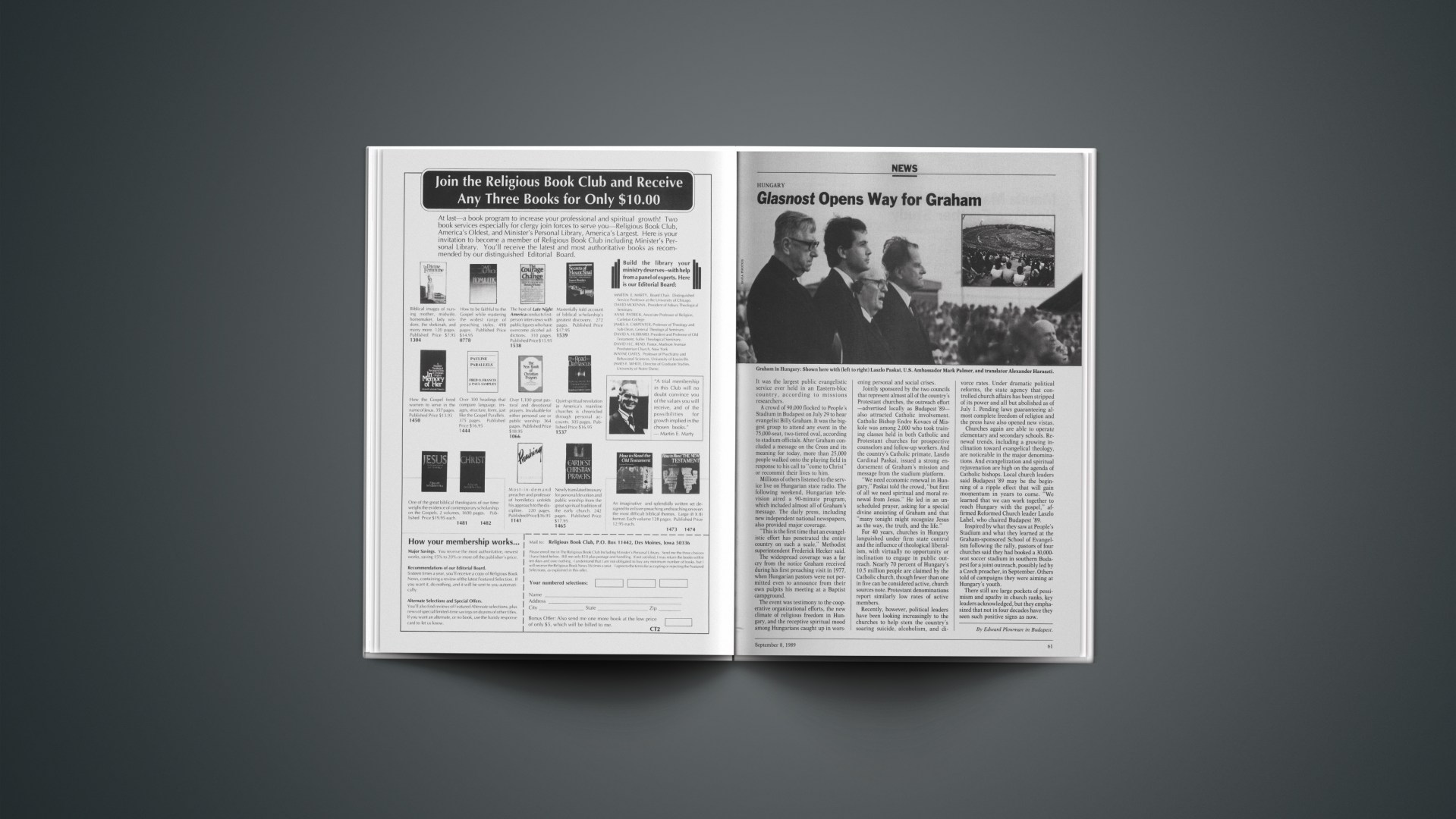It was the largest public evangelistic service ever held in an Eastern-bloc country, according to missions researchers.
A crowd of 90,000 flocked to People’s Stadium in Budapest on July 29 to hear evangelist Billy Graham. It was the biggest group to attend any event in the 75,000-seat, two-tiered oval, according to stadium officials. After Graham concluded a message on the Cross and its meaning for today, more than 25,000 people walked onto the playing field in response to his call to “come to Christ” or recommit their lives to him.
Millions of others listened to the service live on Hungarian state radio. The following weekend, Hungarian television aired a 90-minute program, which included almost all of Graham’s message. The daily press, including new independent national newspapers, also provided major coverage.
“This is the first time that an evangelistic effort has penetrated the entire country on such a scale,” Methodist superintendent Frederick Hecker said.
The widespread coverage was a far cry from the notice Graham received during his first preaching visit in 1977, when Hungarian pastors were not permitted even to announce from their own pulpits his meeting at a Baptist campground.
The event was testimony to the cooperative organizational efforts, the new climate of religious freedom in Hungary, and the receptive spiritual mood among Hungarians caught up in worsening personal and social crises.
Jointly sponsored by the two councils that represent almost all of the country’s Protestant churches, the outreach effort—advertised locally as Budapest 89—also attracted Catholic involvement. Catholic Bishop Endre Kovacs of Miskole was among 2,000 who took training classes held in both Catholic and Protestant churches for prospective counselors and follow-up workers. And the country’s Catholic primate, Laszlo Cardinal Paskai, issued a strong endorsement of Graham’s mission and message from the stadium platform.
“We need economic renewal in Hungary,” Paskai told the crowd, “but first of all we need spiritual and moral renewal from Jesus.” He led in an unscheduled prayer, asking for a special divine anointing of Graham and that “many tonight might recognize Jesus as the way, the truth, and the life.”
For 40 years, churches in Hungary languished under firm state control and the influence of theological liberalism, with virtually no opportunity or inclination to engage in public outreach. Nearly 70 percent of Hungary’s 10.5 million people are claimed by the Catholic church, though fewer than one in five can be considered active, church sources note. Protestant denominations report similarly low rates of active members.
Recently, however, political leaders have been looking increasingly to the churches to help stem the country’s soaring suicide, alcoholism, and divorce rates. Under dramatic political reforms, the state agency that controlled church affairs has been stripped of its power and all but abolished as of July 1. Pending laws guaranteeing almost complete freedom of religion and the press have also opened new vistas.
Churches again are able to operate elementary and secondary schools. Renewal trends, including a growing inclination toward evangelical theology, are noticeable in the major denominations. And evangelization and spiritual rejuvenation are high on the agenda of Catholic bishops. Local church leaders said Budapest 89 may be the beginning of a ripple effect that will gain momentum in years to come. “We learned that we can work together to reach Hungary with the gospel,” affirmed Reformed Church leader Laszlo Lahel, who chaired Budapest 89.
Inspired by what they saw at People’s Stadium and what they learned at the Graham-sponsored School of Evangelism following the rally, pastors of four churches said they had booked a 30,000-seat soccer stadium in southern Budapest for a joint outreach, possibly led by a Czech preacher, in September. Others told of campaigns they were aiming at Hungary’s youth.
There still are large pockets of pessimism and apathy in church ranks, key leaders acknowledged, but they emphasized that not in four decades have they seen such positive signs as now.
By Edward Plowman in Budapest.










